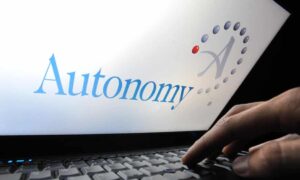
The British technology firm Autonomy struck millions of dollars’ worth of “handshake deals” through which it paid customers to buy its software, the jury in the fraud trial of its co-founder Mike Lynch has heard.
Lynch, who co-founded and led Autonomy, has pleaded not guilty to 16 counts of wire fraud, securities fraud and conspiracy. He stands accused of orchestrating a huge fraud before Hewlett-Packard’s blockbuster takeover of the company in 2011.
Since his criminal trial started in San Francisco on Monday, federal prosecutors have alleged Autonomy used a “variety of accounting tricks” to inflate its revenue growth. This included so-called “round trip” deals, they claim, whereby customers were paid money so they could in effect pay Autonomy back, in apparently unrelated deals.
During the trial’s opening arguments, the assistant US attorney Adam Reeves used a hypothetical example of a firm paying a customer $110, under the expectation that the firm would receive $100 back in the form of a purchase. “Add a few zeroes,” he said, “and that is what Autonomy was doing.”
On Thursday, the government called John Baiocco, an executive at Capax Global, a New Jersey-based firm that had worked with Autonomy. He described how, starting in 2009, Autonomy offered to “fund” Capax’s purchases of its software.
“The seller of the software is paying the buyer of the software?” asked Reeves. “Yes,” replied Baiocco, who said it was part of a “handshake deal”. In total there were about 10 such deals, he testified, worth millions of dollars.
Capax would bill Autonomy for offering “services” linked to the software it bought, Baiocco said. Asked whether Capax “at any time” actually performed such services, Baiocco replied: “No.”
When Capax received money from Autonomy, Baiocco said the company would turn around the funds and pay the UK software firm “pretty much the next day”.
Federal prosecutors have argued that Autonomy used such schemes to boost its revenue and increase its growth – impressing investors and, eventually, HP.
Chris Morvillo, an attorney for Lynch, noted that Baiocco did not mention Lynch during his questioning by prosecutors. Baiocco said that he had met him “maybe once or twice”.
Capax also sold Autonomy software on to other companies. Baiocco testified under questioning by Morvillo that, in the event a purchase by one firm fell through, Autonomy had agreed in handshake deals to help Capax sell the software to another.
